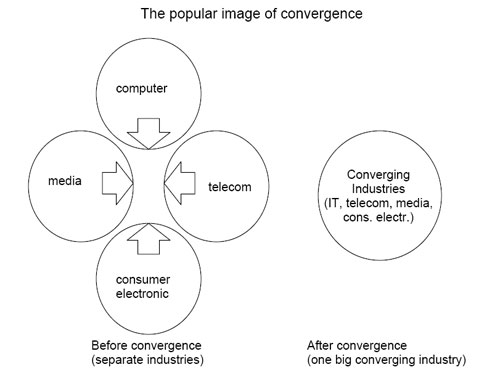Difference between revisions of "Technological convergence"
| Line 28: | Line 28: | ||
==Experts:== | ==Experts:== | ||
* | * | ||
*Media conglomerates (AOL, Telefonica, New York Times, Google, Yahoo) | |||
*Technology providers (Cisco, Intel, Sony, Nokia, Motorola, Samsung) | |||
*[http://www.wireless.kth.se Wireless@KTH] | |||
==Timing:== | ==Timing:== | ||
Revision as of 11:10, 11 April 2006
Description:
The Concise Oxford English Dictionary defines the word Converge as “come together from different directions so as eventually to meet”. There is no explicit common accepted definition of convergence in the economic academic literature. Adapting the dictionary definition to economic terminology would yield something like “merging of markets”.
Van Dale the Dutch accepted dictionary defines convergence as follows "samenkomst in een punt".
Wikipedia defines technological convergence as follows: the modern presence of a vast array of different types of technology to perform very similar tasks. The term convergence is commonly used in reference to the synergistic combination of voice (and telephony features), data (and productivity applications) and video onto a single network. These previously separate technologies are now able to share resources and interact with each other creating new efficiencies. Source:Wikipedia
A working definition, derived from term usage in management practice, would be something like “a confluence and merging of hitherto separated markets, removing entry barriers across the market and industry boundaries”. The popular image used to illustrate this convergence Jonas Lind Page 4 2004-05-08 was three or four circles gradually moving into each other (e.g. Negroponte cited in Brand 1987 and Wirtz 2001). They usually represented IT, telecom, media and consumer electronics. The four industries were expected to merge into one big blob “the converging industries”, in which the old industry barriers were teared down and where everybody would compete with everybody (figure below). (Source: Wireless@KTH)
In Retail: Convergence is fast becoming the hot issue in the retail sector. Companies are striving to determine how best to exploit the latest technology to create a multi-channel offering, enabling them to reach and transact with customers in a variety of ways, including stores, mail order, e-commerce, interactive television and WAP technology. The need to establish an integrated and “future-proof” technological architecture, with a common sales platform into which all retail channels feed, will be vital to success in the new world of “ubiquitous commerce”. (Source: Economist)
In media: Convergence of media occurs when multiple products come together to form one product with the advantages of all of them. For example, the PlayStation 2 is not only a games console, but also a CD player, DVD player and Internet connector. Mobile phones are another good example, in that they increasingly incorporate digital cameras, mp3 players, camcorders, voice recorders, and other devices. (Source: Wikipedia)
Enablers:
- Technological developments
- Consumer demand
Inhibitors:
- divergence
- consumer demands
Paradigms:
bla
Experts:
- Media conglomerates (AOL, Telefonica, New York Times, Google, Yahoo)
- Technology providers (Cisco, Intel, Sony, Nokia, Motorola, Samsung)
- Wireless@KTH
Timing:
bla
Web Resources:
- Wireless@KTH http://www.wireless.kth.se
